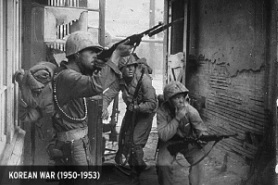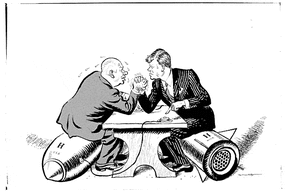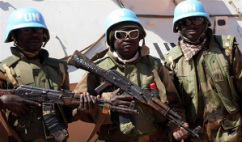Unbalanced?
The United Nations peacekeeping may be considered "flawed" because, of all the countries that it consists of, there are five permanent members that outweigh the 188 other countries. These permanent members were the five main Allied powers during World War II, they are: United States, United Kingdom, Russia, China, and France. If it were not for these five countries, the Axis powers would have taken over the world, so these five should have more say then the others that did not help or helped little during WWII. It is also up to these five to be the largest contributors to the United Nations such as the United States, but China and Russia give little because they were communist for some time. If any member of the Security Council votes against something that directly threatens peace, that rotating/permanent member will be out of the Security Council until the conflict is resolved. Also, all the other member countries combined give about 1% towards the UN budget.
United Nations peacekeeping uses force to solve conflicts/wars.
Korean War (1950 ~ 1953)

The Korean War was the first major act of United Nations peacekeeping and was caused by involvement of the members of the Security Council with the people of North and South Korea. After World War II, Japan had surrendered Korea as territory to the Soviet Union getting the North, and the United States getting the South. North Korea was turned communist, while South Korea was democratic. The war started on June 25th 1950 when North Korea had invaded South Korea causing the UN to react as North Korea was threatening peace. Also, the Soviet was out of the Security Council at the time because they were boycotting United Nation involvement with North and South Korea. The Soviet Union provided North Korea with materials, and the Chinese helped North Korea fight the United Nations, while the United Nations (mostly the United States) helped South Korea fend off North Korean invaders. After three years of bloodshed an armistice was signed and peace was kept between North and South Korea at the 38th parallel. This is a prime example of how the UN will kick people out of the Security Council if they vote against UN help with wars. At the UN conference to discuss the Korean War, all the members were there except for two: Soviet Union, and China. Both of these permanent members aided the North Koreans in some way, and both got kicked out until the conflict was resolved.
Cold War (1947 ~ 1991)

The Cold War was coined off during World War II, although United States and the Soviet Union were allies, tension was bad between them. It was only when President Roosevelt died, did the war start as Roosevelt had left the Soviets' do as they wish, but President Truman began an anti - communism campaign. The war was basically democracy against communism, United States represented democracy as being one of the two super powers, the Soviet Union represented communism because it was the other super power. The war was "fought" spreading propaganda, and advertising democracy or communism, very few military conflicts between the two super powers actually occured. The United Nations worked to stop the conflicts between the two members of the Security Council, as it basically was a childish game of "Anything you can do, I can do better." There was really nothing the United Nations could do to stop these two nations, but them intervening did help as both could have just wiped each other out with nuclear weapons. The United States "won" because the USSR ran out of materials and money to keep producing technology that would best United States technology. The United Nations didn't fight a war with these two super powers, but still had a part in keeping peace in what could have been a threat to mankind.
Gulf War I (1990 ~ 1991)

The Gulf War I otherwise known as the Persian Gulf War was fought between Irag and 32 different nations courtesy of the UN. The war was instigated byIraqi president Saddam Hussein because he has been threatening Israel with nuclear attacks. Iraq has been building chemical and nuclear weapons since the 1980s, and after the Iran- Iraq war, Iraq had a very powerful military rivaled that by the United States. However, Iraq had invaded it's neighbor Kuwait for oil which is a "Black Diamond" in the middle east which caused retaliation by the UN. The UN first did an embargo of trade on Iraq, but President Hussein wouldn't stop he continued with his threats to Israel, and invasion of Kuwait. Finally, the UN waged war against Iraq as it was threatening peace. Iraq then launched "Scud" missiles to Israel hoping to seperate the massive UN force. The US lead "Operation Desert Storm" was a large bombardment by the US planes and destroyed Iraq controlled territories, and Iraqi facilities. The United Nations then set inspectors to Iraq and an interesting discovery they made was a program that showed how Iraq could be able to mass produce chemical and nuclear weapons.
United Nations peacekeeping uses democracy to help better the lives of people.
Cambodia: The largest UN peacekeeping mission in history, the UN made a huge impact in Cambodia and helped with things such as election, information and education, military restraint, unified command, and repatriation.
Liberia: After fourteen years of civil war and over 250,000 people dead, the people of Liberia gave peacekeeping authority to the UN, in hopes of making it safer for the people and to rebuild all that was destroyed.
Mozambique: The UN mission has been a great success: Monitored cease-fires, the combatants have stopped resisting, and a transition to democracy take place.
Namibia/Tajikistan: UN peacekeepers have worked for democratic change.
Macedonia: The UN mission gave the Macedonians democratic institutions, and to join the European community.
Kosovo/East Timor/Sierra Leone: The UN presence in these areas make it safer for thousands of people to have better lives, these people are living better because of the UN.
Sudan/Darfur/Chad: UN peacekeepers are soon to be in Sudan, Darfur, and Chad, they are working to help the people there.
Liberia: After fourteen years of civil war and over 250,000 people dead, the people of Liberia gave peacekeeping authority to the UN, in hopes of making it safer for the people and to rebuild all that was destroyed.
Mozambique: The UN mission has been a great success: Monitored cease-fires, the combatants have stopped resisting, and a transition to democracy take place.
Namibia/Tajikistan: UN peacekeepers have worked for democratic change.
Macedonia: The UN mission gave the Macedonians democratic institutions, and to join the European community.
Kosovo/East Timor/Sierra Leone: The UN presence in these areas make it safer for thousands of people to have better lives, these people are living better because of the UN.
Sudan/Darfur/Chad: UN peacekeepers are soon to be in Sudan, Darfur, and Chad, they are working to help the people there.
Not perfect, but a necessity.
United Nations peacekeeping has it's flaws, and at times they do fail at peacekeeping. However, they have had great successes in peacekeeping and helped the lives of many. Wars for peace have been fought, democracy has been spread around. so many countries would have been greatly impacted by UN peacekeeping. There are times when the UN fails to help people in some places, but that alone can't make a valid opinion of UN peacekeeping. Maybe if all the rotating member countries combined start giving more then 1%, maybe more success will follow. UN peacekeeping was and still is mostly funded by the United States, both financial and military. The main goal of the UN was to prevent a World War III, so far there hasn't been a WWIII so that in itself is a great feat. The UN is a gem, it tries to help what it can, but cannot help everyone, it would be wrong to say that UN peacekeeping is a failure and a waste of money. If there are countries that UN peacekeeping couldn't help at, it just means that country was already messed up, making it difficult to make a big impact on the area.
